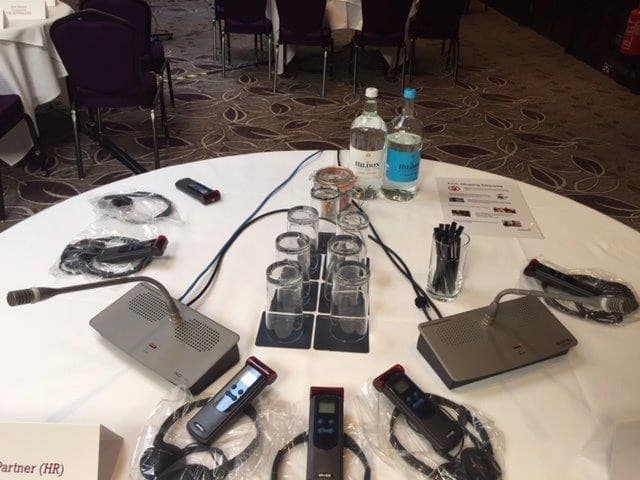
Do we still need interpretation for European Works Councils?
For better or worse (and we all have a view) Brexit has happened. So, is that the end of the European Works Council as far as British based companies are concerned? The answer would appear to be no and, indeed, even more negotiation may have to take place. The relevant EU directives are still in place and a company with 1000+ employee in the EU/EAA with at 150 or more staff ion each of two EU countries needs an EWC. It could just be that interpretation for the European Works Council is needed more than ever
Of course, British based staff are now out of that mathematical equation but that does not necessarily mean the automatic demise of an EWC just because the numbers no longer add up. Indeed, it has been suggested that closure of a company’s EWC is simply an option and not an obligation in these circumstances. In practice, there will be a need to negotiate and find a way forward.
In addition, the continued participation of UK based members may not automatically end as a result of Brexit. It is always possible that the Council may have been set up with this in mind an d UK based members are specifically still included. Even where this is not the case, provision exists for third country (which the UK now is) representation and how this looks will have to be subject of negotiation.
So, is interpretation an essential part of a European Works Council? We would;d argue yes.
Interpretation is a crucial component of a successful European Works Council (EWC) meeting, providing numerous benefits for all participants involved. EWC meetings bring together employee representatives from different European Union (EU) member states to discuss and negotiate on cross-border issues related to their company. Given the diverse backgrounds of the participants, interpretation plays a vital role in ensuring that all participants are able to understand and contribute to the discussion effectively.
Firstly, interpretation facilitates clear communication between participants who may speak different languages. This enables all parties to be fully engaged and participate in the discussions, leading to more productive and meaningful conversations. Additionally, interpretation helps to avoid misunderstandings or misinterpretations, which could otherwise arise due to linguistic and cultural differences.
Secondly, interpretation enhances the inclusivity of EWC meetings, ensuring that all participants are able to express their views and opinions in their native language. This helps to create a more comfortable and welcoming atmosphere, where participants feel valued and respected.
Thirdly, interpretation ensures compliance with legal requirements, as EWC meetings are regulated by EU law, and interpretation is often mandatory. Interpreters can help to ensure that all participants understand the legal implications of decisions made during the meeting.
We believe interpretation is a critical component of a successful EWC meeting, ensuring clear communication, inclusivity, and legal compliance. By providing interpretation, EWC meetings can be more effective, productive, and meaningful, leading to better outcomes for all involved.
All in all, it may well be a busy time at present for companies and their EWC’s. We can help by providing a full language support service to your EWC meeting. This includes top quality simultaneous interpreters with years of relevant EWC experience, all the neccessary equipment for either in person or remote meetings, transcribers to record verbatim accounts of meetings and translators to render all documents into the native languages of participants.
If you think we can assist with interpretation for your European Works Council, please get in touch to request a quote
reference:
https://www.cms-lawnow.com/ealerts/2021/05/the-future-of-european-works-councils-after-brexit
